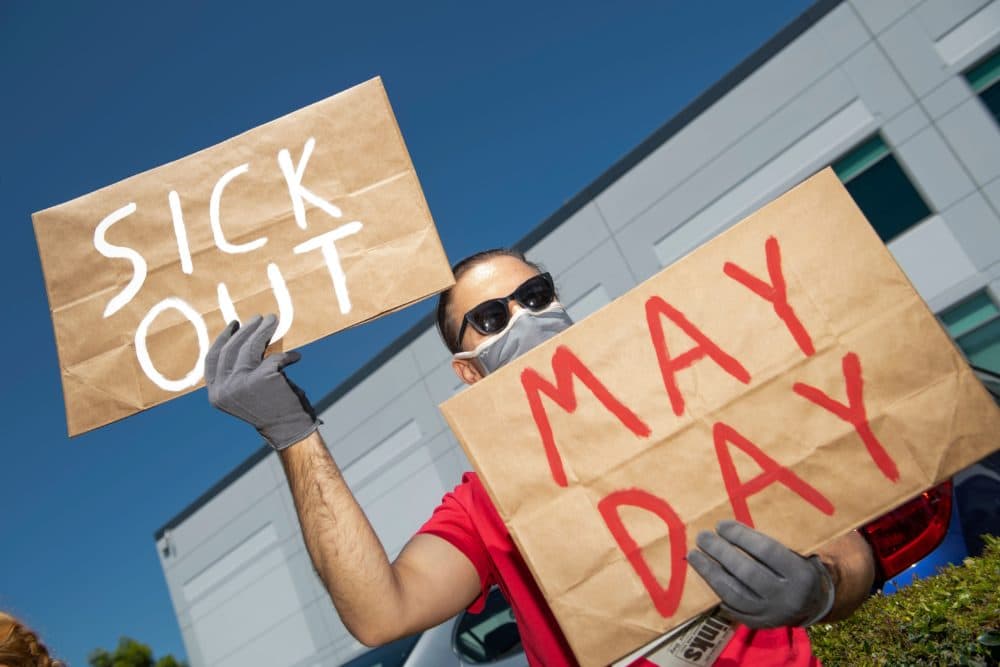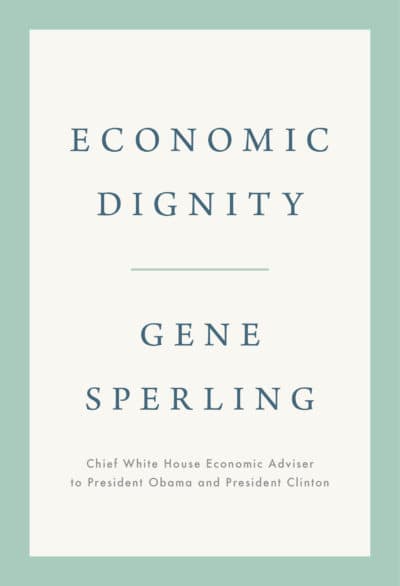Advertisement
Economist Gene Sperling Says US Needs To Improve 'Economic Dignity' For All Workers

The 33 million unemployment claims paint a picture of a U.S. economy devastated by the coronavirus pandemic.
But those numbers don’t give us the most important measure, says economist Gene Sperling, former economic adviser to presidents Bill Clinton and Barack Obama.
He says we ought to focus on what he calls economic dignity, which is also the title of his new book. Martin Luther King Jr. referred to the idea in his famous speech at the Memphis sanitation workers strike in 1968.
“He not only said that all labor has dignity, but he said that the sanitation worker was as essential as the physician,” Sperling says. “This is the moment where that has become very real.”
Farmers, delivery drivers, grocery store workers and home health care workers “are now people literally saving our lives,” he says. But many are still underpaid and working in unsafe conditions without personal protective equipment.
“I think the dissonance that we are rightly feeling is that you do not achieve dignity just with the applause, just with the respect,” Sperling says. “You have to have dignified treatment.”
Interview Highlights
On mortgage forbearance, a policy he favored while working for the Obama administration
“To lose your house, to have to move your family out to risk homelessness — this is among the greatest assaults of dignity. So mortgage forbearance is almost the easiest thing that you can do. I mean, it's just saying that while we're going through this difficult time, you know, I believe you could tack it on. We should make it interest free, give people a chance to get back on their feet. But we have to do the same for people who are renting.”
On paycheck guarantees and other aid initiatives
“That's why I think you have to look for what are the bold solutions that solve a lot of these separate issues. And I think you see two being put out there. … What we've seen is unemployment that gives you 100% of your wages. That will give people their paycheck that allows them to pay their rent. Or there's a large proposal out by people as diverse as Congresswoman [Pramila Jayapal] to Bernie Sanders to [Sen. Mark Warner] that says if a company will take a worker they would have otherwise laid off and paid them their full salary and keep them on health care, we’ll help foot that bill. Those are the big proposals because they solve several problems at once. They make sure you're made whole and that therefore you can make the rent, the car payment, the things that would allow you to sustain a basic level of economic dignity in an unprecedented economic crisis, pandemic like we are living through right now.”
Advertisement
On the plight of gig workers
“I think it was a good first step that we included gig workers in the unemployment insurance. And I think a big test for our country will be, will we now reconstruct our programs to make sure that regardless of who your employer is ... that there is a basic level of health care, unemployment insurance, paid sick leave that's available to every American? I mean, that is a must if you're going to have a universal guarantee of economic dignity.”
On whether long-term economic policy could change after the pandemic
“Well, this really is a test for us as a country now. Does this moment where we literally are relying on many of the workers we have ignored and treated the worst, does it create a new revelation or inspiration to be better than we've been? And look, I've been in two White Houses. I know more than anybody that you are constrained by political reality and divided government. But I can't help but believe that this moment is not going to move the country in somewhat of the right direction, that we should be learning the lessons for our long-term economic impact and not just about the temporary measures to get us through this moment.”
Julia Corcoran produced and edited this interview for broadcast with Peter O'Dowd. James Perkins Mastromarino and Samantha Raphelson adapted it for the web.
Excerpt From 'Economic Dignity'
Today we are in a moment of major reexamination of how well our existing model for modern capitalism is serving the majority of working people. Can it create paths out of poverty and reverse accelerating economic inequality, repair the hollowing out of the middle class, and cope with dramatic technological change? Such major questions rightly call for equally major new policies and structural changes. It is precisely at moments when we want to make giant strides that we should make sure we have clarity on our ultimate destination. Economic dignity should be the North Star to guide that journey.

In a 2005 book, I wrote about why “economic dignity” should be seen as one of three defining progressive values underlying our policy agenda. As I continued to explore the question of what our ultimate end goal for economic policy should be, I became more convinced that ensuring a universal level of economic dignity was more than a core value: it should be the central, organizing goal of economic policy. This is not a quest for an unreachable utopian ideal. There is no reason that we, as a nation, should not be able to guarantee a basic level of economic dignity for everyone.
The value of economic dignity reveals both the most admirable ideals and the brutal hypocrisy in our history. The protection and promotion of dignity in our economic lives is a powerful explainer of many moments in our history when the need for collective action through government policy triumphed over the call for rugged individualism and idealized free markets. On the other hand, as with American values like freedom, the brutal hypocrisy of our history regarding dignity is devastating. It is no exaggeration to say that true economic dignity has, through law and discrimination, been denied to a majority of our population for a majority of our history through systemic discrimination, violence against Native Americans, and the shame of slavery—the most extreme antithesis imaginable of respect for human dignity.
I have chosen in this book to neither ignore our shameful history on racism and sexism nor dismiss the degree to which values of economic dignity informed our nation’s highest—though unrealized—economic ideals. As Martin Luther King Jr. and Thurgood Marshall masterfully showed, there can be great power in elevating cherished though unrealized American ideals as a means to force our nation to wrestle with the devastating gap between self-professed values and the harsh and discriminatory treatment of tens of millions of fellow Americans. They chose to elevate such unrealized aspirations as a means of both exposing the depth of unfulfilled promises to African Americans and making clear that their demands for racial justice represented not special pleading but a call to make progress toward realizing universal American ideals. As Pauli Murray, the remarkable civil rights pioneer who refused to give up her seat on a public bus in Petersburg, Virginia, fifteen years prior to Rosa Parks,1 wrote in 1945: “As an American I inherit the magnificent tradition of an endless march toward freedom and toward the dignity of all mankind.”
Calling for economic dignity to be our ultimate end goal for economic policy carries with it the obligation to give a more complete and enduring definition of dignity than is currently used in our economic and political dialogue. Dignity has often been used in modern political debate to signify the deeper and more intrinsic human value at stake in the fight for civil rights, secure retirements, decent pay, and workers’ rights. Others see dignity as a matter of when and whether a person feels demeaned or treated with respect. Each of these usages is compelling. Yet in isolation, they do not come close to creating a complete definition of what it would mean for a person to experience economic dignity—and for a nation to create a set of policies that would guarantee a basic level of economic dignity for all its people.
I have come to the firm view that a complete and enduring definition of economic dignity must rest on three integral and irreplaceable pillars. First, the economic capacity to care for family while not being deprived of fully experiencing the moments, joys, and roles that humans most value. Simply put, being able to not just put food on the table but to be at the table as well, and in your children’s bedroom for story time and at the bedside for the most heartwarming and heartbreaking moments of caring for older loved ones. Second, being able to pursue purpose and potential—to have true first and second chances in your economic life to contribute and find meaning and to never feel given up on. And third, to be able to work and participate in the economy—to work, care for family, and pursue potential—with respect and not with abuse, domination, or humiliation. Economic dignity, defined by these three pillars, represents a more full, complete, and stable definition that can stand strong no matter what variation or circumstance is considered.
There is still the question of who one wants to write a book for. I considered a more academic approach, aware of the deep philosophical literature on dignity and the field of welfare economics that seeks to delve into how to measure well-being. Yet such an approach would have fit neither my experience nor my motivation. My expertise is in the realm of national economic policy, and the audience I want to reach is the concerned citizens, advocates, journalists, students, and policymakers who debate over kitchen tables, social media, and the floors of Congress. I aim for this book to be thought-provoking for those who live and breathe economic policy—but I have written with a much broader audience in mind that does not require an economics background.
In my last year as President Obama’s top White House economic adviser, I chose to start each speech by reciting oft-mentioned economic statistics—from debt as a percentage of GDP to productivity indicators—but then reminding each audience that none of those metrics are end goals. I would state that each and every one of them had worth only to the degree that it helped us fulfill a deeper American value like whether we were a nation where the accident of birth did not determine the outcome of your life; whether each of us had a chance to rise; whether each of us could work, raise our families, and retire with dignity. Whether I got it exactly right then or whether I get it exactly right now in this book, I could feel in every audience the hunger for an economics defined by our most basic human values: one rooted in the clear understanding that there can be no end goal for economic policy other than what aims to lift up our happiness, fulfillment, and inner sense of dignity. That is the purpose of this book.
From Economic Dignity by Gene Sperling. Reprinted by arrangement with Penguin Press, a member of Penguin Group (USA) LLC, A Penguin Random House Company. Copyright © Gene Sperling, 2020.
This segment aired on May 7, 2020.
